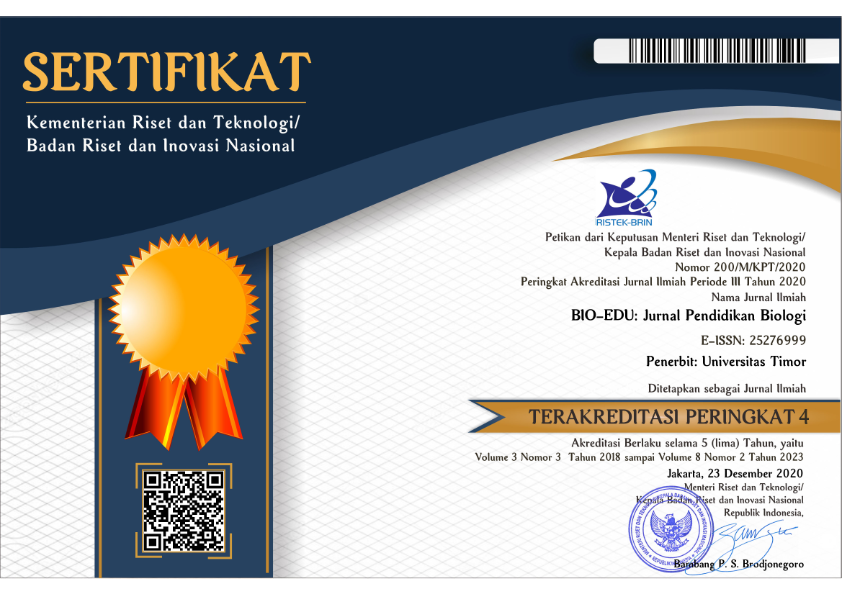Hubungan Self Efficacy dan Kemandirian Belajar Terhadap Hasil Belajar Siswa Pada Materi Sel
DOI:
https://doi.org/10.32938/jbe.v7i1.1888Keywords:
Self Efficacy; Learning Independence; Learning Outcomes; Cell MaterialsAbstract
This study aims to determine the correlation between self-efficacy and learning independence on student learning outcomes in cell material in XI Math and Science class of 6 Senior High School Tasikmalaya in the 2021/2022 academic year. The method in this study uses the correlational method. The population this research of class XI MIPA SMAN 6 Tasikmalaya in the 2021/2022 academic year. The sample used was class XI MIPA 5 and XI MIPA 7 for the academic year 2021/2022 with a total of 72 students, the sample was taken using purposive sampling technique. Data collection techniques used tests in the form of daily tests of cell material and non-tests in the form of instruments self-efficacy questionnaires and learning independence questionnaires. Hypothesis testing using multivariate correlation test. The results of the correlation test analysis show that the relationship between self-efficacy and learning independence on student learning outcomes is obtained by a correlation coefficient (R) of 0.489, which means that the strength of the relationship between variables is at a moderate level, and the coefficient of determination (R2) is 0.239, which means that the variables of self-efficacy and learning independence are variable. collectively contributed 23.9% to student learning outcomes
References
Amaliyah, S. (2019). Hubungan Kecemasan Dan Self-Efficacy Terhadap Hasil Belajar Kimia Siswa. Universitas Islam Negeri Syarif Hidayatullah.
Asih, N. & Ramdhani, S. (2019). Peningkatan Kemampuan Pemecahan Masalah Matematis dan Kemandirian Belajar Siswa Menggunakan Model Pembelajaran Means End Analysis. Jurnal Pendidikan Matematika. 8 (3). 435-446.
Fudayanti, F.E.(2011). Pengaruh Sumber Belajar dan Kemandirian Belajar Siswa Terhadap Prestasi Belajar Ekonomi Siswa Kelas X Madrasah Aliyah Negeri 1 PATI. Skripsi. Semarang: Fakultas Ekonomi Universitas Negeri Semarang
Ghufron, M.N,. & Risnawita, R. (2012). TEORI-TEORI PSIKOLOGI. Yogyakarta: Ar-Ruzz Media.
Hanifah. 2012. Peningkatan Self Efficacy dan Berpikir Kritis Melalui Penerapan Model Pembelajaran Inkuiri Materi Pokok Asam Basa Kelas XI SMAN 9 Surabaya. Unesa Joutnal of Chemical Education, 1(2): 27-33.
Helyati & Wardhani, S. (2019). PENINGKATAN HASIL BELAJAR SISWA MELALUI MODEL DISCOVERY LEARNING PADA MATERI SEL. Jurnal Penelitian Pendidikan Biologi, 3(2), 89-95.
Hernawan, E. (2019). Pengantar Statistika untuk Penelitian Pendidikan. Tasikmalaya: LPPM Universitas Siliwangi.
Hernawati, D., Amin, M., Irawati, M. H., & Indriwati, S. E. (2016). Analisis Self efficacy Mahasiswa Pada Matakuliah Zoologi. Jurnal Pendidikan Biologi (Bioed), 2016, 1–9.
Marneli et al. (2020). Korelasi Self Efficacy Dengan Hasil Belajar Biologi di SMA 1 Rambatan Kabupaten Tanah Datar Sumatera Barat. SIMBIOSA. 9(2). 158-165.
Nurlaili, et al. (2018). Hubungan Kemandirian Belajar Dan Self-Efficacy Dengan Hasil Belajar Geografi Siswa Kelas XI IS SMA NEGERI PEUKAN BADA ACEH BESAR. Jurnal ilmiah mahasiswa pendidikan geografi FKIP Unsyiah.
Oktarin, S., Auliandari, L., & Wijayanti, T. F. (2018). Analisis Kemandirian Belajar Siswa pada Mata Pelajaran Biologi Kelas X SMA YKPP Pendopo. BIOEDUSENCE, 2(2), 104–115.
Ormrod, J.E. 2010. Psikologi Pendidikan. R. Rahmat, & A. Kumara (Eds.), Jakarta: Erlangga.
Schunk, D.H., & Meece, J.L. 2006. Self-efficacy development in adolescenceso. In F. Pajares, & T. Urdan (Eds.). Self-efficacy Beliefs of Adolescents. Greenwich, CT: Information Age Publishing. 71-96.
Siregar, R.A. (2018). Hubungan Self efficacy Dengan Kemandirian Belajar Pada Siswa Smpit Al-Fakhri Sunggal. Universitas Medan Area.
Susilowati, N. E. (2018). Analisis Self efficacy Dan Hubungannya Terhadap Literasi Sains Mahasiswa Pendidikan Fisika Perguruan Tinggi Negeri Di Lampung. Universitas Islam Negeri Raden Intan.
Downloads
Published
Issue
Section
License
The Authors submitting a manuscript do so on the understanding that if accepted for publication, the copyright of the article shall be assigned to BIO-EDU: Jurnal Pendidikan Biologi and Departement of Biology Education, Universitas Timor as the publisher of the journal. Copyright encompasses rights to reproduce and deliver the article in all form and media, including reprints, photographs, microfilms, and any other similar reproductions, as well as translations.
BIO-EDU journal and Departement Biology Education, Universitas Timor, and the Editors make every effort to ensure that no wrong or misleading data, opinions, or statements be published in the journal. In any way, the contents of the articles and advertisements published in BIO-EDU are the sole and responsibility of their respective authors and advertisers.
Users of this website will be licensed to use materials from this website following the Creative Commons Attribution-ShareAlike 4.0 International License.



















